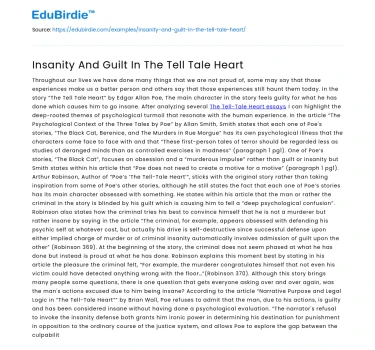Throughout our lives we have done many things that we are not proud of, some may say that those experiences make us a better person and others say that those experiences still haunt them today. In the story “The Tell Tale Heart” by Edgar Allan Poe, The main character in the story feels guilty for what he has done which causes him to go insane. After analyzing several The Tell-Tale Heart essays, I can highlight the deep-rooted themes of psychological turmoil that resonate with the human experience.
In the article “The Psychological Context of the Three Tales by Poe” by Allan Smith, Smith states that each one of Poe's stories, “The Black Cat, Berenice, and The Murders in Rue Morgue” has its own psychological illness that the characters come face to face with and that “These first-person tales of terror should be regarded less as studies of deranged minds than as controlled exercises in madness” (paragraph 1 pg1). One of Poe’s stories, “The Black Cat”, focuses on obsession and a “murderous impulse” rather than guilt or insanity but Smith states within his article that “Poe does not need to create a motive for a motive” (paragraph 1 pg1).
Save your time!
We can take care of your essay
- Proper editing and formatting
- Free revision, title page, and bibliography
- Flexible prices and money-back guarantee
Arthur Robinson, Author of “Poe’s ‘The Tell-Tale Heart’”, sticks with the original story rather than taking inspiration from some of Poe’s other stories, although he still states the fact that each one of Poe’s stories has its main character obsessed with something. He states within his article that the man or rather the criminal in the story is blinded by his guilt which is causing him to fell a “deep psychological confusion”. Robinson also states how the criminal tries his best to convince himself that he is not a murderer but rather insane by saying in the article “The criminal, for example, appears obsessed with defending his psychic self at whatever cost, but actually his drive is self-destructive since successful defense upon either implied charge of murder or of criminal insanity automatically involves admission of guilt upon the other” (Robinson 369). At the beginning of the story, the criminal does not seem phased at what he has done but instead is proud at what he has done. Robinson explains this moment best by stating in his article the pleasure the criminal felt, “For example, the murderer congratulates himself that not even his victim could have detected anything wrong with the floor…”(Robinson 370).
Although this story brings many people some questions, there is one question that gets everyone asking over and over again, was the man's actions excused due to him being insane? According to the article “Narrative Purpose and Legal Logic in “The Tell-Tale Heart”” by Brian Wall, Poe refuses to admit that the man, due to his actions, is guilty and has been considered insane without having done a psychological evaluation. “The narrator's refusal to invoke the insanity defense both grants him ironic power in determining his destination for punishment in opposition to the ordinary course of the justice system, and allows Poe to explore the gap between the culpability-negating legal definition of insanity and actual mental illness” (Wall paragraph 3). In order to be considered clinically insane, one would have to go through a psychological evaluation which the man did not. He diagnosed himself as isane to excuse his actions and to prevent him from being arrested and being sent to prison. One may argue that this man would be guilty due to reason on insanity however,
Guilt has powerful effects on the human mind, it can even cause mental illnesses that drastically affect humans, such illnesses include Hysteria, Psychosis, and Insanity. The definition of Hysteria is a “psychological disorder (not now regarded as a single definite condition) whose symptoms include conversion of psychological stress into physical symptoms (somatization), selective amnesia, shallow volatile emotions, and overdramatic or attention-seeking behavior”, this mental illness is shown within Poe’s story “The Tell Tale Heart, Psychosis is “a severe mental disorder in which thought and emotions are so impaired that contact is lost with external reality”, this illness has symptoms such as schizophrenia and paranoia, and lastly Insanity is “the condition of being insane; a derangement of the mind”.
In Edgar Allen Poe’s story “The Tell Tale Heart”, guilt and insanity are the main themes within the story but there are many other themes hidden within. Although the man or the criminal claims that he is not guilty due to him being insane, he still felt the guilt of committing the crime and hearing the beating heart.
Works Cited
- Brian Wall. “Narrative Purpose and Legal Logic in ‘The Tell-Tale Heart.’” The Edgar Allan Poe Review, vol. 14, no. 2, 2013, pp. 129–143. JSTOR, www.jstor.org/stable/10.5325/edgallpoerev.14.2.0129.
- Cleman, John. “Irresistible Impulses: Edgar Allan Poe and the Insanity Defense.” American Literature, vol. 63, no. 4, 1991, pp. 623–640. JSTOR, www.jstor.org/stable/2926871.
- Smith, Allan. “The Psychological Context of Three Tales by Poe.” Journal of American Studies, vol. 7, no. 3, 1973, pp. 279–292. JSTOR, www.jstor.org/stable/27553070.
- Robinson, E. Arthur. “Poe's ‘The Tell-Tale Heart.’” Nineteenth-Century Fiction, vol. 19, no. 4, 1965, pp. 369–378. JSTOR, www.jstor.org/stable/2932876.
- Shen, Dan. “Edgar Allan Poe's Aesthetic Theory, the Insanity Debate, and the Ethically Oriented Dynamics of ‘The Tell-Tale Heart.’” Nineteenth-Century Literature, vol. 63, no. 3, 2008, pp. 321–345. JSTOR, www.jstor.org/stable/10.1525/ncl.2008.63.3.321.






 Stuck on your essay?
Stuck on your essay?

